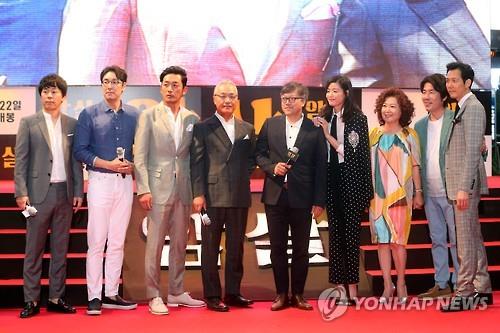- California Assembly OKs highest minimum wage in nation
- S. Korea unveils first graphic cigarette warnings
- US joins with South Korea, Japan in bid to deter North Korea
- LPGA golfer Chun In-gee finally back in action
- S. Korea won’t be top seed in final World Cup qualification round
- US men’s soccer misses 2nd straight Olympics
- US back on track in qualifying with 4-0 win over Guatemala
- High-intensity workout injuries spawn cottage industry
- CDC expands range of Zika mosquitoes into parts of Northeast
- Who knew? ‘The Walking Dead’ is helping families connect
Court rules S. Korean movie ‘Assassination’ not plagiarism

The stars of the movie “Assassination” — Choi Duk-moon, Jo Jin-woong, Ha Jung-woo, Lee Kyung-young, Jeon Ji-hyun, Kim Hye-sook, Oh Dal-soo and Lee Jung-jae — along with director Choi Dong-hoon (C) poses for a photo during a publicity event in Seoul on July 7, 2015. The movie was released in South Korea on July 22.
SEOUL, (Yonhap) — A district court ruled Thursday that a domestic action film featuring colonial-era assassination attempts by Korean independence fighters did not plagiarize a local novel.
The Seoul Central District Court dismissed a suit filed by Choi Jong-rim, seeking 10 billion won (US$8.7 million) in compensation against director Choi Dong-hoon, production company Caper Film Co. and the 2015 film’s distributor Showbox.
The novelist said the film’s plot is similar to his novel, “Corean Memories,” in that a woman is the lead character and Kim Koo, one of the most revered Korean patriots, organizes and leads a group to kill key Japanese figures and Japanese collaborators.
The book was first published in 2003 and published again in April 2015.
The court, while acknowledging similarities in abstract types of characters and plots between the two, said they still have a lot of differences in how those ideas are specified and expressed.
“Incidents or abstract types of characters in novels, films, scenarios and plays cannot be protected under the copyright law,” the court said. “Similarities in specific expressions should be acknowledged (to be called a production plagiarism).”
The same court in August also rejected a request by Choi to keep the film from being screened. It said many of the parts Choi claimed as plagiarism, including a female sniper and assassination schemes, are plots that cannot be protected by the copyright law.
Choi said he would appeal the ruling.
The film, which tells the story of three Korean independence fighters teaming up to assassinate the commander of the Japanese troops in Korea in the early 1930s, passed 12 million in attendance in the country, making it the sixth-most successful South Korean film.











